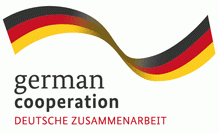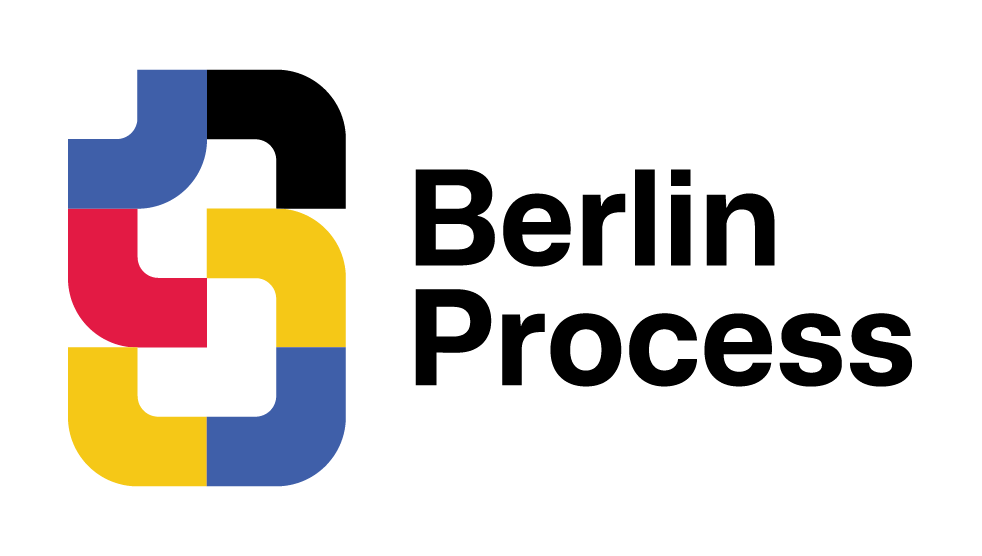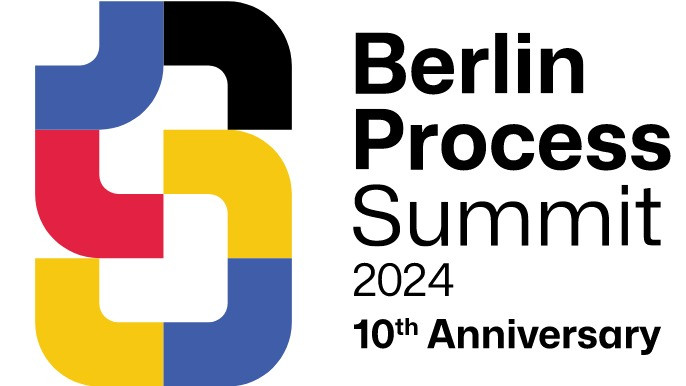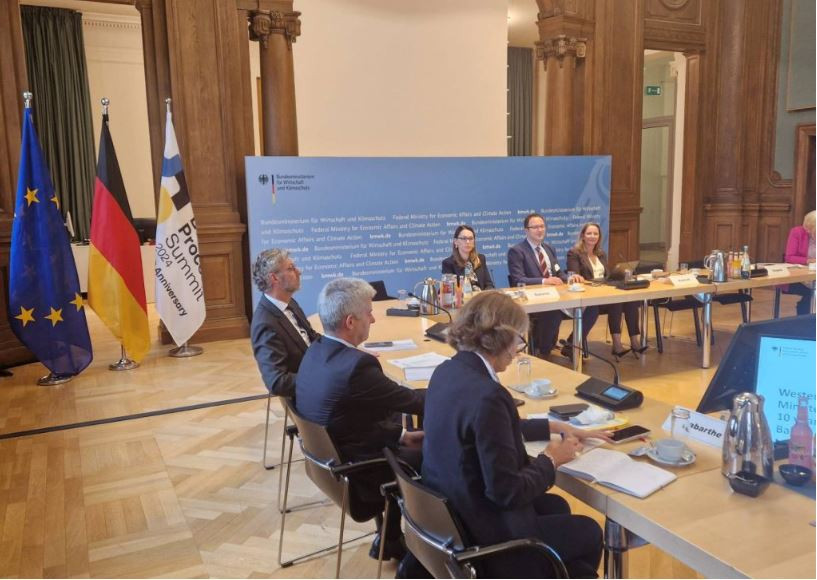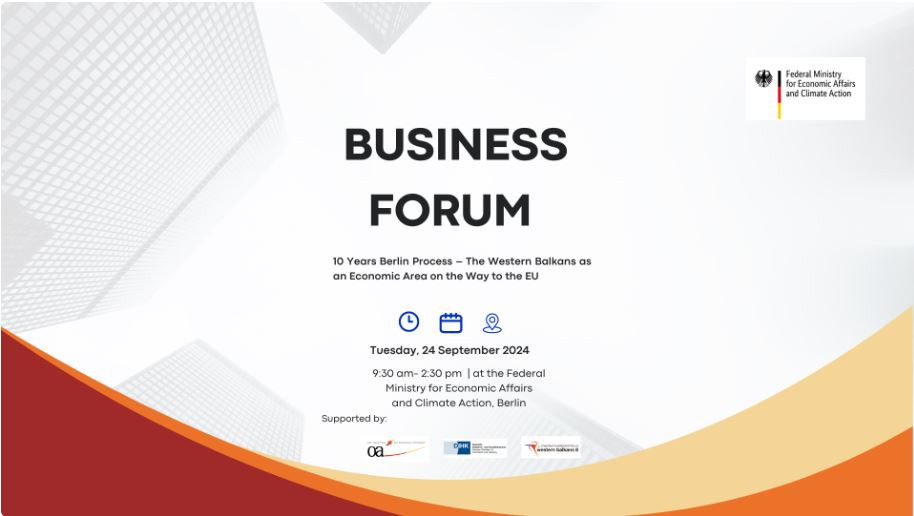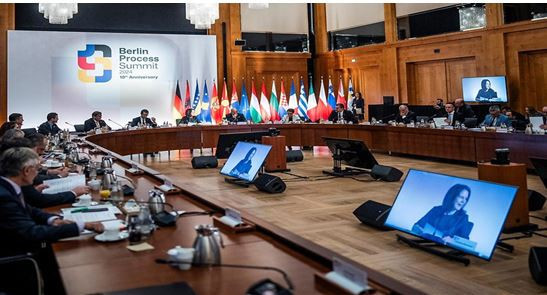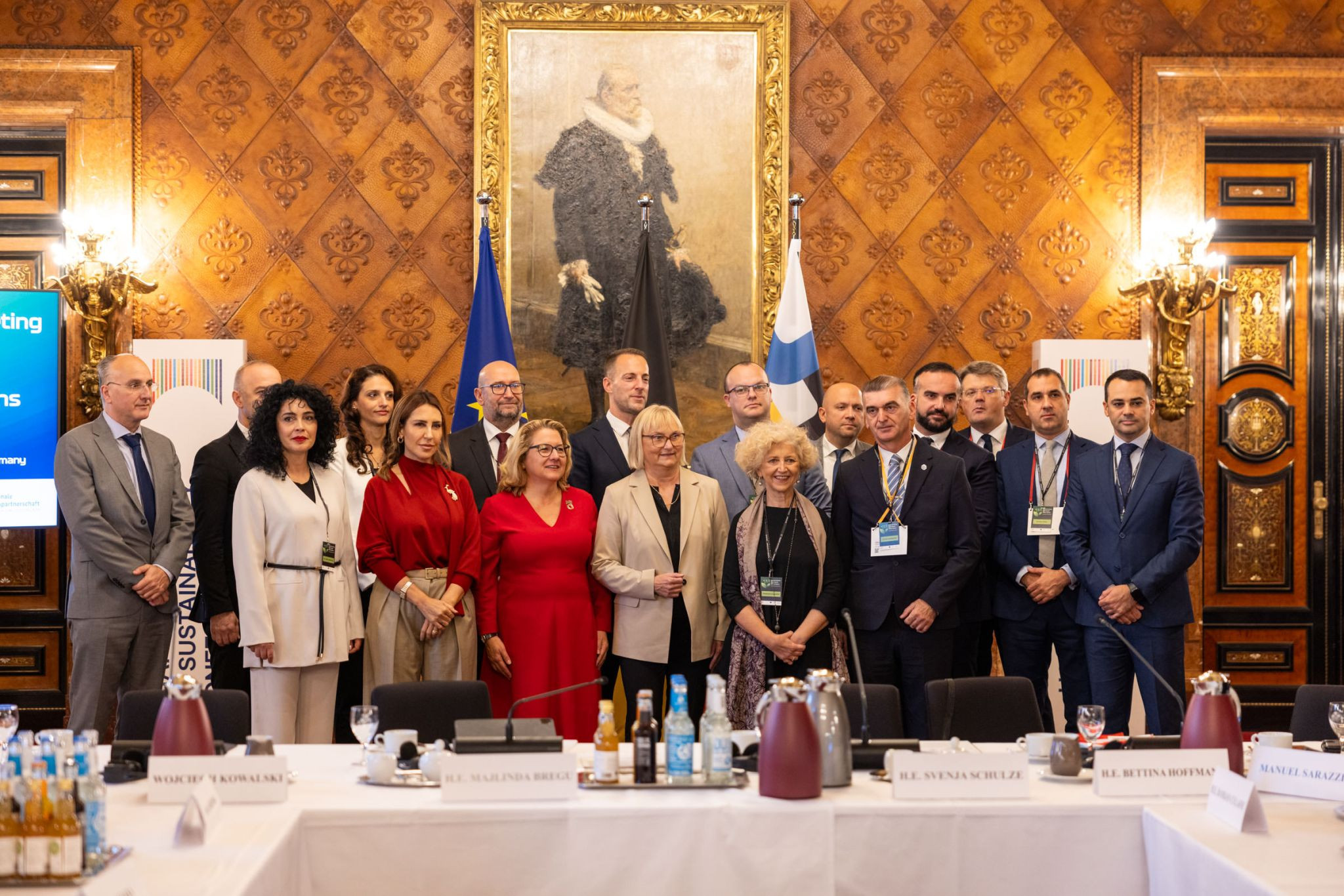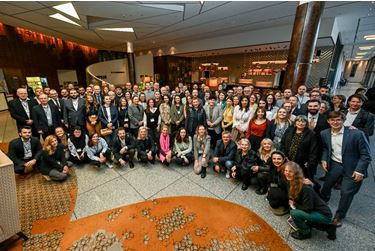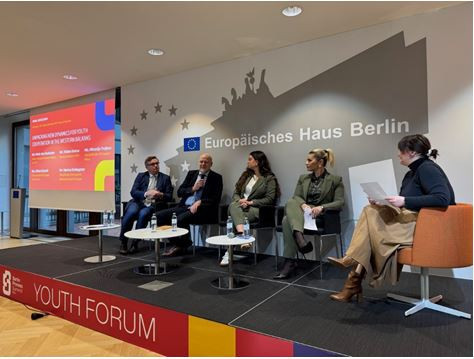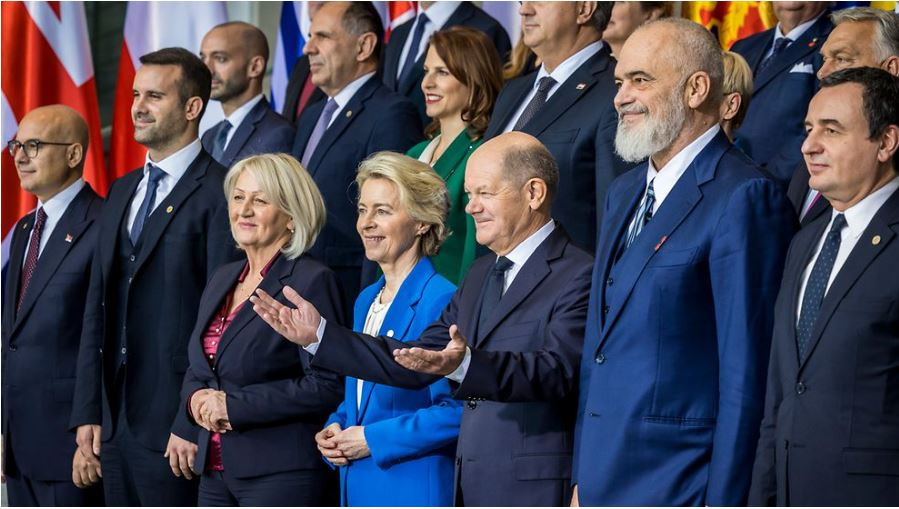In 2024, the Berlin Process marked its 10th anniversary, highlighting a decade of efforts to strengthen regional cooperation and support the Western Balkans’ path toward EU integration. This year’s meetings underscored continued progress, with a focus on connectivity, economic growth, and sustainable reforms.
Early in the year, experts and policymakers convened at the Agricultural Policy Forum in Jahorina, emphasizing the need for sustainable agricultural practices and rural development. In Sarajevo, the Green Mobility Summit addressed strategies for advancing sustainable transport systems across the region.
As the year progressed, attention turned to social inclusion, with a Ministerial Meeting on Roma Integration in Berlin, where ministers evaluated progress and strategies to improve the socio-economic standing of Roma communities. Gender equality was also at the forefront, with the Gender Equality Forum highlighting the need for policies that promote women’s empowerment and equal opportunities.
Economic cooperation remained a core pillar of the Berlin Process, with a Business Forum and a Meeting of Ministers of Economic Affairs in Berlin bringing together regional leaders and business representatives to explore investment opportunities and economic growth strategies. Science and innovation also took center stage at the Joint Science Conference, where researchers discussed ways to strengthen scientific collaboration in the region.
High-level political engagement was evident throughout the year. The Meeting of Foreign Ministers reinforced diplomatic relations and regional commitments, while the Ministerial Meeting on the Green Agenda in Hamburg focused on accelerating environmental sustainability efforts. Parliamentarians gathered in Berlin for the Parliamentary Dimension of the Berlin Process, ensuring legislative frameworks align with EU integration efforts.
Civil society and youth also played an active role. The Civil Society and Think Tank Forum in Berlin provided a platform for policy discussions and regional cooperation, while the Youth Forum engaged young leaders in shaping the future of the Western Balkans, emphasizing their role in governance and decision-making.
The culmination of these efforts was the Berlin Process Summit on October 14, hosted by German Chancellor Olaf Scholz. Bringing together leaders from the Western Balkans, EU representatives, and international organizations, the summit commemorated a decade of achievements and set the course for the future. Discussions reinforced the importance of continued collaboration in economic integration, energy and transportation connectivity, the green transition, and social development.
Looking ahead, the Berlin Process will continue to serve as a vital platform for aligning the Western Balkans with EU standards, demonstrating a shared commitment to a more connected, prosperous, and sustainable future.
Please find relevant documents here.
| Document | View |
|---|---|
| Chair's Conclusions Summit 2024 | View |
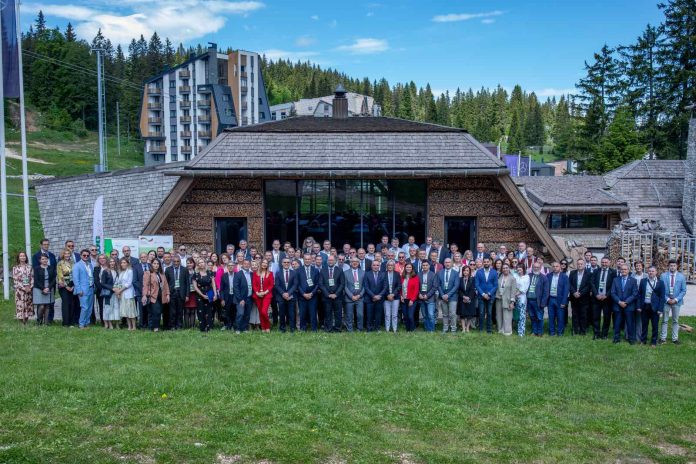
More than 130 policymakers, researchers, academia, representatives of the civil society, private sector and other stakeholders from 17 countries across Europe gathered together at the 24th Agricultural Policy Forum (APF), titled “Reassessing of Agricultural and Rural Development Policy in South-Eastern Europe (SEE) and Challenges Ahead: Food Sovereignty, Climate Change Impact on Agriculture, Demographic Renewal of Rural Areas”, held in Jahorina, Bosnia and Herzegovina on 5th and 6th of June 2024.
The main objective of the Forum as a policy dialogue platform, was to address policy challenges in agriculture and rural development in South-Eastern Europe (SEE) considering the global, European, and regional dimensions related to food sovereignty and security, climate change impact on agriculture and demographic renewal of rural areas. The Jahorina Agenda 2024 summarizes the main outcomes of the Forum, and will be presented and discussed at the 18th Annual Working Meeting of Ministers of Agriculture from South Eastern Europe scheduled on September 24th, 2024 in North Macedonia.
The foreseen aim of the Ministerial Meeting should be the adoption of the Joint Declaration, which should be taken into consideration at the Berlin Process Summit. Please find the Jahorina Agenda for your download here. The Agricultural Policy Forum 2024 was held under the joint auspices of the Ministry of Foreign Trade and Economic Relations of Bosnia and Herzegovina and the Regional Rural Development Standing Working Group (SWG) in SEE.
Picture: SWG Secretariat
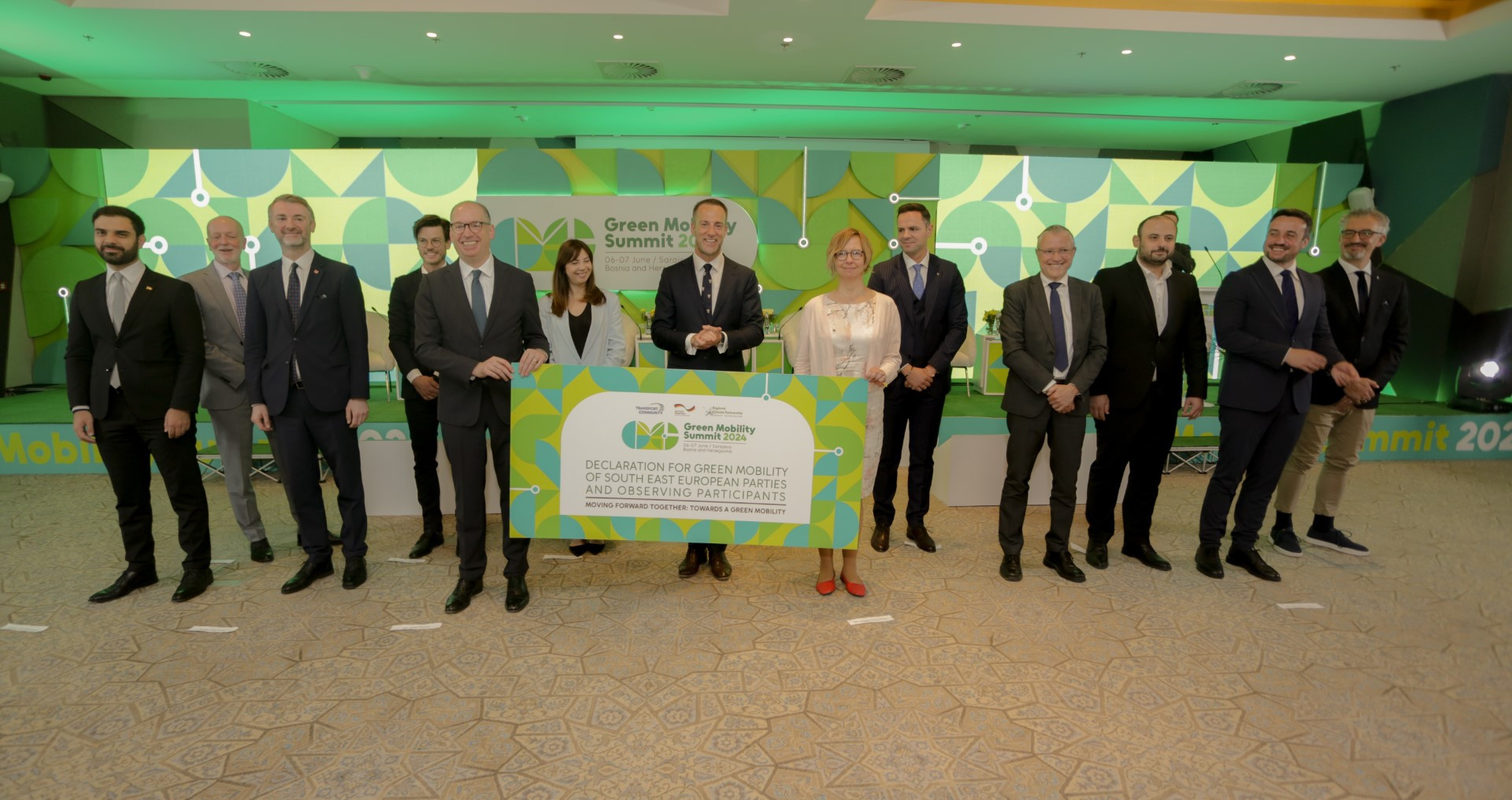
The Green Mobility Summit, held on 6-7 June 2024 in Sarajevo, Bosnia and Herzegovina, brought together more than 200 experts and leaders to discuss and promote innovative sustainable transport solutions.
Organised by the Transport Community Permanent Secretariat and the German Federal Ministry for Economic Cooperation and Development (BMZ), through the Regional Climate Partnership between Germany and the Western Balkans, the Summit explored the possible ways to improve transport infrastructure and climate resilience in the Western Balkans, Georgia, Moldova, and Ukraine. The Green Mobility Summit is an integral part of the Regional Climate Partnership between Germany and the Western Balkans. This partnership was initiated through a Joint Declaration of Intent, endorsed by the leaders of the Western Balkans and Germany in October 2023 during the Berlin Process summit in Tirana.
The Summit featured esteemed speakers who shared valuable insights on advancing green mobility in the region.
Mr. Nihad Uk, Prime Minister of Canton Sarajevo, emphasised commitment to Net Zero Cities, while Mr. Adebayo Babajide from the EU Delegation to BiH highlighted the EU’s emphasis on green mobility and sustainability, alignment with its climate goals and stressed the need for significant investment and collaboration to decarbonise transportation systems. Lastly, Mr. Adnan Šteta, Minister of Traffic of Canton Sarajevo, noted that Sarajevo is undergoing a major public transport overhaul, including new lines, improved connections, and purchasing electric buses for the first-time ever, with ambitious plans for further advancements in urban transport.
Mr. Matej Zakonjšek, the Director of the Transport Community Permanent Secretariat, praised the Summit for showcasing progress in green mobility in the Western Balkans, Georgia, Moldova and Ukraine, outlining the importance of ongoing support for regional initiatives. Parliamentary State Secretary Niels Annen emphasised the Summit’s importance for achieving the EU’s carbon-neutral goal and highlighted the involvement of 25 regional cities in sustainability efforts. Minister of Communications and Transport of Bosnia and Herzegovina Mr. Edin Forto noted the country's advancements in green mobility, particularly in public transport. Ms. Magda Kopczynska from the European Commission confirmed the commitment to concrete measures for sustainable and resilient mobility.
Key topics included transitioning towards zero-emission mobility and bridging the coordination between local and regional authorities to enhance sustainable transport initiatives. The event culminated in the endorsement the Declaration for Green Mobility, which advocates for sustainable mobility and includes The Clean Bus and Clean Fleet Platform, and Declaration on Cycling.
The Green Mobility Summit highlighted the commitment to working together on broad environmental and mobility improvements. One of the highlights of the event was the promotion of local products that serve to enhance sustainability, namely BPARCO’s advanced security racks for bicycles and e-scooters, which has since been put to use in front of the BHRT building, and RUFF CYCLES bicycles, blending classic motorcycle design with modern craftsmanship. The Summit reminded stakeholders that investing in green infrastructure and sustainable mobility bears many possibilities for enhancing the long-term economic and social prosperity of the region at large.
The commitments outlined during the Summit, supported by collective experiences and jointly proposed solutions, represent a significant advancement toward achieving a cleaner, more efficient, and sustainable transport system in the region. The insights and pledges from the Green Mobility Summit will undoubtedly play a crucial role in shaping a more sustainable and interconnected Western Balkans.
Following the successful Green Mobility Summit, the cooperation between the GIZ and the Transport Community continues to thrive. ORF ETC’s subproject ProSUMP made significant contributions by presenting two pivotal topics at the Green Mobility Summer School in Prishtina, organized by the Transport Community. ProSUMP's sessions focused on two key areas: Sustainable Urban Mobility and Adaptation Measures in Sustainable Urban Mobility Plans. Additionally, ProSUMP supported the preparation of the SUM site visit focusing on Public transport and the Center for Traffic Management. The event spanned four days and brought together a diverse array of experts and participants from the Western Balkans and the EU.
Throughout the event, the participants have tackled a broad spectrum of topics, ranging from climate mitigation and adaptation to the digitisation of transport systems at both national and local levels. Furthermore, the Urban Mobility framework for Western Balkans, announced as one of the ORF ETC (ProSUMP) activities during the Summit, will include the needs of local, regional, and national authorities for developing or improving national/regional programs including NUMPs and Integrated Transport Laws, the state of play and awareness of SUMPs with recommendations that are in line with EU approaches and TEN-T policy based on Regulation (EU) 2024/1679. Transport Community is involved in preparation of the document as well.
The next event that will be organised jointly with the Transport Community, CIVINET Slovenia, Croatia, SEE and ORF ETC (ProSUMP) from 9-10 October in Split, Croatia will enhance the dialogue between representatives from transport WB6 Ministries and Cities/Municipalities, at the national and local levels, including representatives of the AoMs that have the role of coordinating SUMP actions with both levels.
Picture: Amar Jazić
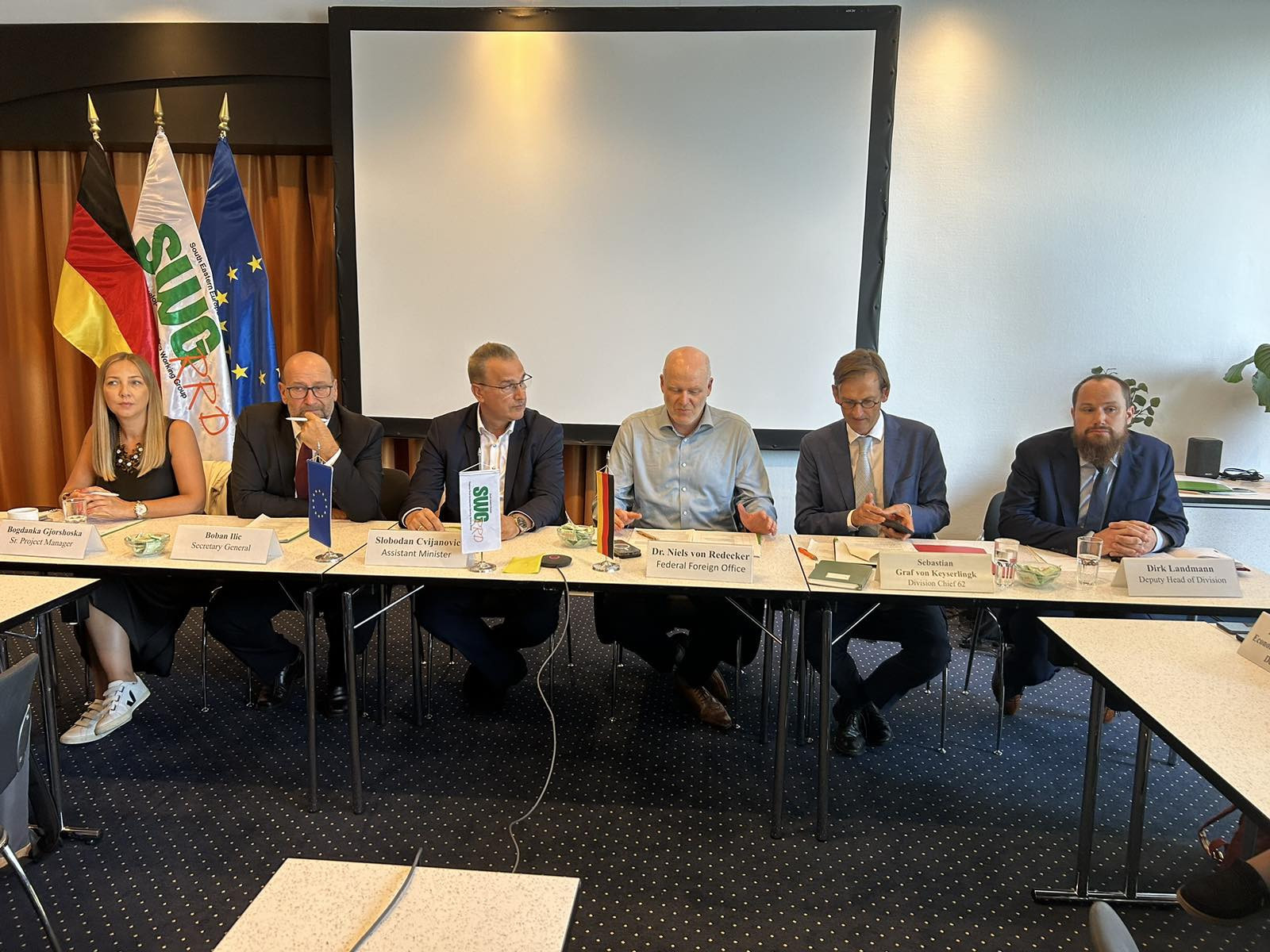
In conjunction with the 60th Assembly Session of the Regional Rural Development Standing Working Group (SWG), the Agriculture and Food Sherpa meeting of the Berlin Process has been held.
Representatives of the Ministries of Agriculture of the Western Balkans, Delegates in the SWG Assembly and Berlin Process Agriculture Sherpas discussed and confirmed the draft Declaration on Food and Agriculture.
The Declaration on Food and Agriculture is set to be adopted by the Ministers and Heads of Delegations responsible for Agriculture and Rural Development from the Western Balkans during the 18th Annual Working Meeting of Ministers of Agriculture that will be held on September 24th, 2024, in Skopje, North Macedonia.
The Declaration will subsequently be presented at the Berlin Process Summit in October 2024. Its goal is to ensure that agriculture and rural development are integral components of the Berlin Process, enhancing cooperation and reinforcing these sectors as vital to the EU integration efforts of the Western Balkans.
Picture: SWG Secretariat
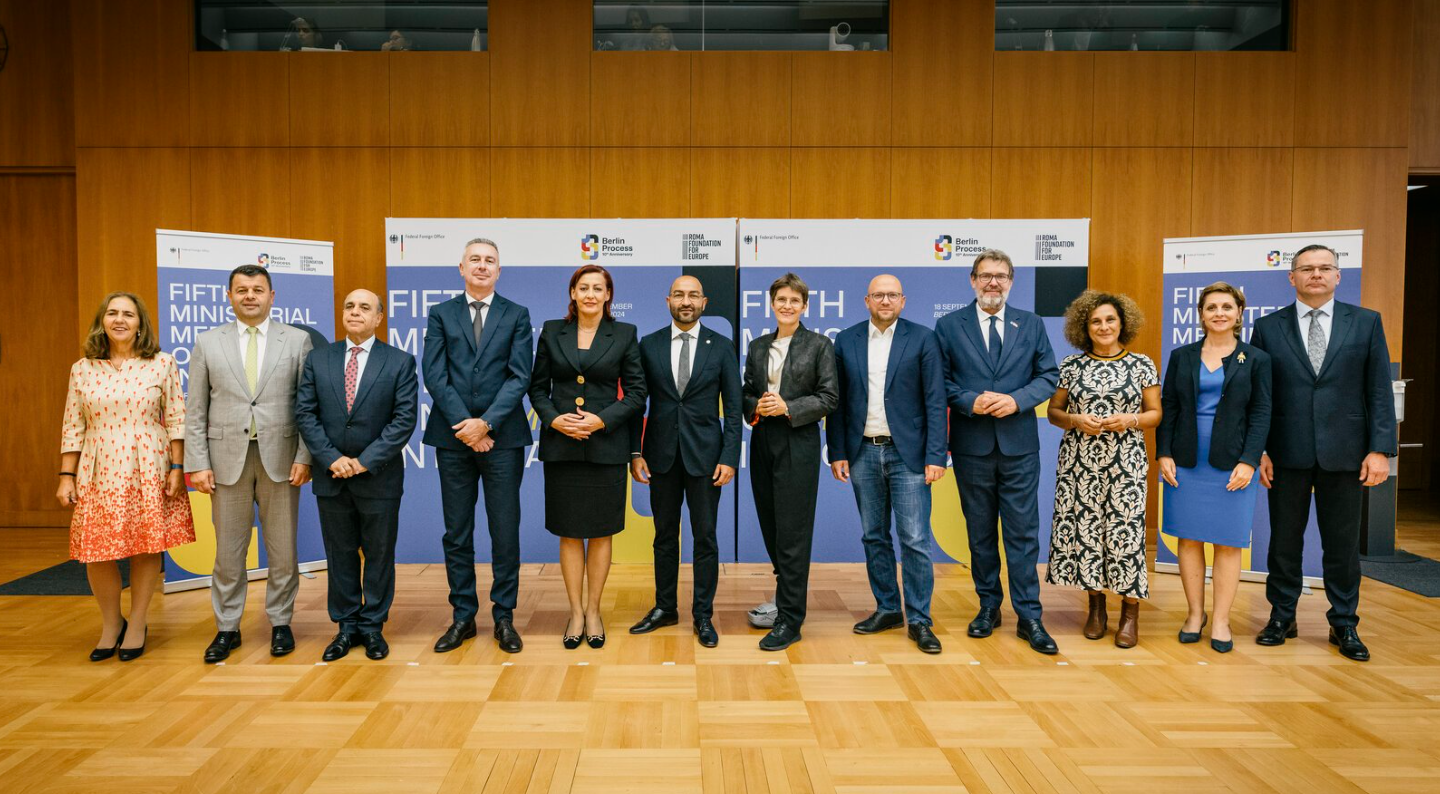
As the 10th Anniversary of the Berlin Process approaches, the commitment to strengthening and increasing regional cooperation remains as steadfast as ever. This significant milestone coincides with the 5th anniversary of the Declaration of the Western Balkans Partners on Roma Integration within the EU Enlargement Process, which was adopted during the 2019 Berlin Process Summit in Poznan.
The convergence of these two anniversaries provides a perfect backdrop for the Fifth Roma Ministerial Meeting on EU Integration, hosted by Minister of State Dr. Anna Lührmann on September 18, 2024, in Berlin. Previous Ministerial Meetings took place in Tirana in 2020, Sarajevo in 2021, Podgorica in 2022, and Skopje in 2023 and 2024. This year’s meeting will begin with a reception at ERIAC in Berlin on the evening before the official program.
Since 2019, the Roma Ministerial Meetings have become a key element of the Berlin Process, which aims to enhance regional cooperation and foster integration with the European Union. These meetings have focused on addressing the socio-economic marginalization of Roma communities and aligning policies with EU standards. Critical areas of attention include employment, education, housing, healthcare, documentation, and combating discrimination.
This year’s Ministerial Meeting will feature the first presentation of an assessment report on the implementation of the Declaration of Western Balkan Partners on Roma Integration from 2019 to 2024. Conducted by the Council of Europe, this report provides a detailed evaluation of the progress made and the challenges that remain. The full assessment report, covering the objectives defined in the Poznan Declaration, will be published after the meeting, offering a comprehensive overview of the current state of Roma integration efforts in the Western Balkans.
The conclusions of the Fifth Roma Ministerial Meeting will be formally adopted at the Berlin Process Summit on October 14, 2024, setting the stage for further action and progress toward Roma inclusion. Ministers participating in the meeting have reaffirmed their commitment to concrete, time-bound actions that involve all relevant line ministries, focusing on ensuring that the inclusion of Roma communities is integrated into the broader framework of EU enlargement and governance reforms.
This Ministerial Meeting highlights the significant strides made over the past five years, as well as the ongoing work required. Progress in Roma employment, housing, education, healthcare access, and anti-discrimination measures underscores the vital role of regional cooperation in tackling complex social challenges. However, a shared understanding persists that Roma communities continue to face significant barriers, particularly in access to fundamental rights and opportunities.
As the 10th anniversary of the Berlin Process and the 5th anniversary of the Poznan Declaration are celebrated, the importance of sustained effort, collaboration, and dedication to achieving lasting change for Roma people becomes ever more apparent. The upcoming Ministerial Meeting is anticipated to further advance these efforts and contribute to a more inclusive future for Roma communities across the region.
You may find the report for download here.
Picture: Photothek
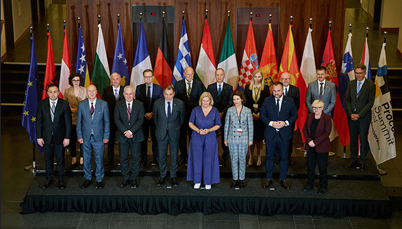
On 17 September, the interior ministers from the Western Balkans met with their counterparts from Bulgaria, France, Greece, Italy, Croatia, Austria, Poland, Slovenia and the United Kingdom at the invitation of Federal Minister of the Interior Nancy Faeser: the meeting focused on combating irregular migration, human trafficking, smuggling of migrants and organized crime.
Nancy Faeser emphasized the importance of cooperation with the countries of the Western Balkans. Cooperation between the EU, the UK and the Western Balkan states is being intensified. Among other things, joint bilateral and multilateral measures in border protection and stronger cross-border cooperation between law enforcement authorities were discussed. Federal Minister of the Interior Faeser emphasized: “We must act together and at a European level on many issues!”
Please find the Declaration of the Ministerial here.
Picture: German Foreign Office
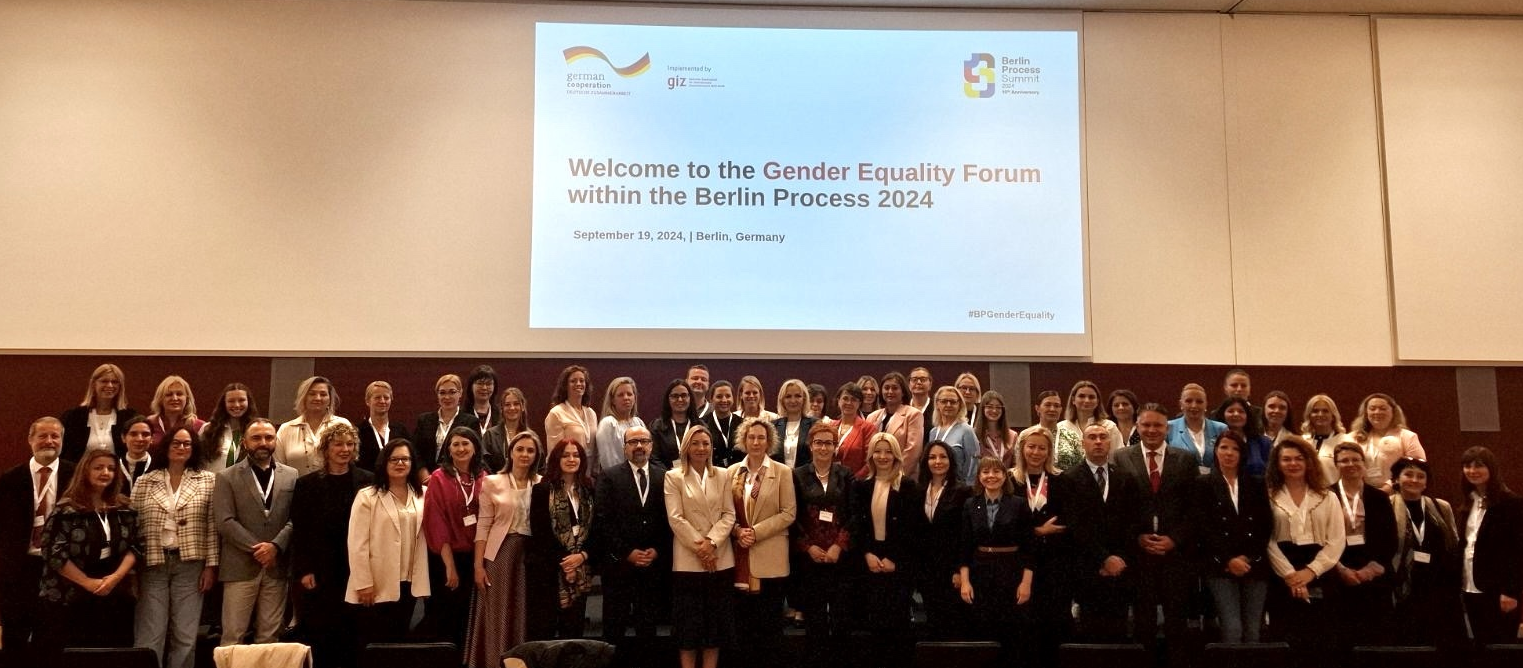
The Gender Equality Forum held within the framework of the Berlin Process, hosted by the German Federal Ministry for Economic Cooperation and Development (BMZ), brought together representatives from the Western Balkans, including government officials, local leaders, and civil society members. The event focused on advancing gender sensitivity within the Berlin Process framework and aimed to address critical gaps in gender mainstreaming across the region.
The forum featured a series of impactful sessions, including keynote speeches and panel discussions. The ongoing exclusion of gender perspectives in the Berlin Process, despite global commitments to gender equality, was emphasized by participants and backed by the respective analysis conducted by Kvinna till Kvinna. The three main topics of the 2024 Gender Equality Forum were:
- Economic Empowerment and Social Security for Women: The forum highlighted the importance of women's economic participation as crucial for fostering social cohesion, driving economic growth, and reducing poverty, with the need to address gender-based violence and improve social security standards recognized as essential steps to promote this participation.
- Women’s Inclusion in Decision-Making: The absence of women’s voices in decision-making results in policies that do not fully address the needs and challenges faced by them. Additionally, it undermines the democratic and effective governance needed for EU accession, thus, women inclusion in leadership roles was acknowledged at the forum as essential for ensuring that policies reflect the needs of the entire population.
- Feminist Perspectives on Reconciliation Processes: The Western Balkans' history of armed conflict has profoundly affected gender relations in the region. Women have experienced both victimization and taken active roles in peace-making. The forum emphasized the need for recognizing women’s roles in peacebuilding and addressing the challenges they face in post-conflict settings.
To advance these objectives, the forum underscores the need for establishing a dedicated regional funding mechanism to support the implementation of its recommendations. This fund would provide sustainable financial resources for gender equality initiatives, enabling national and local governments, along with civil society organizations, to effectively address the identified challenges. Furthermore, the forum strongly advocates for the institutionalization of the Gender Equality Forum as a permanent component of the Berlin Process. By embedding gender equality as a permanent focus, we’re ensuring continuous dialogue, monitoring, and strategy development to address gender disparities in the Western Balkans. This institutionalization will help accelerate our path toward inclusive regional development and ultimately our EU integration.
As the Berlin Process moves into its second decade, it’s crucial to focus on gender equality so that everyone benefits equally from regional cooperation and EU integration. The recommendations from the Gender Equality Forum are key to addressing the current gaps in gender equality, fostering open dialogue, and ensuring the Berlin Process remains aligned with ongoing commitments to gender equality and sustainable development for all.
The forum was organized as part of the "Regional Cooperation for EU Integration" (RCEI) project, implemented by GIZ on behalf of the German Federal Ministry for Economic Cooperation and Development (BMZ). The project aims to place gender equality at the forefront of EU integration efforts for the Western Balkans.
Click here to download the recommendations endorsed at the Forum as well as the report "Missing Gender Perspectives in the Berlin Process - consequences and new opportunities" by the Kvinna till Kvinna Foundation.
Vice Chancellor and Federal Minister for Economic Affairs and Climate Protection, Robert Habeck, received the economic ministers of the Western Balkans and the partners of the Berlin Process at the Federal Ministry for Economic Affairs and Climate Protection on September 24 as part of the Western Balkans Economic Conference. The anniversary provided an opportunity to hold an economic policy review of the Berlin Process. The thematic focus of the conference was the common regional market and energy policy.
Please find relevant documents below:
Chairs Concluions Economic Ministerial Conference 2024
Picture: CEFTA
Under the motto “Ten years of the Berlin Process - The Western Balkans as an economic area on the way to the European Union”, the conference focused on a business forum in addition to the ministerial meeting. Numerous companies active in the Western Balkans and potential investors were able to network and seek direct dialog with politicians. The countries of the Western Balkans hold great potential for the German economy. This is reflected in the high level of interest shown by German businesses in the conference. Around 250 guests from business and politics attended the economic forum.
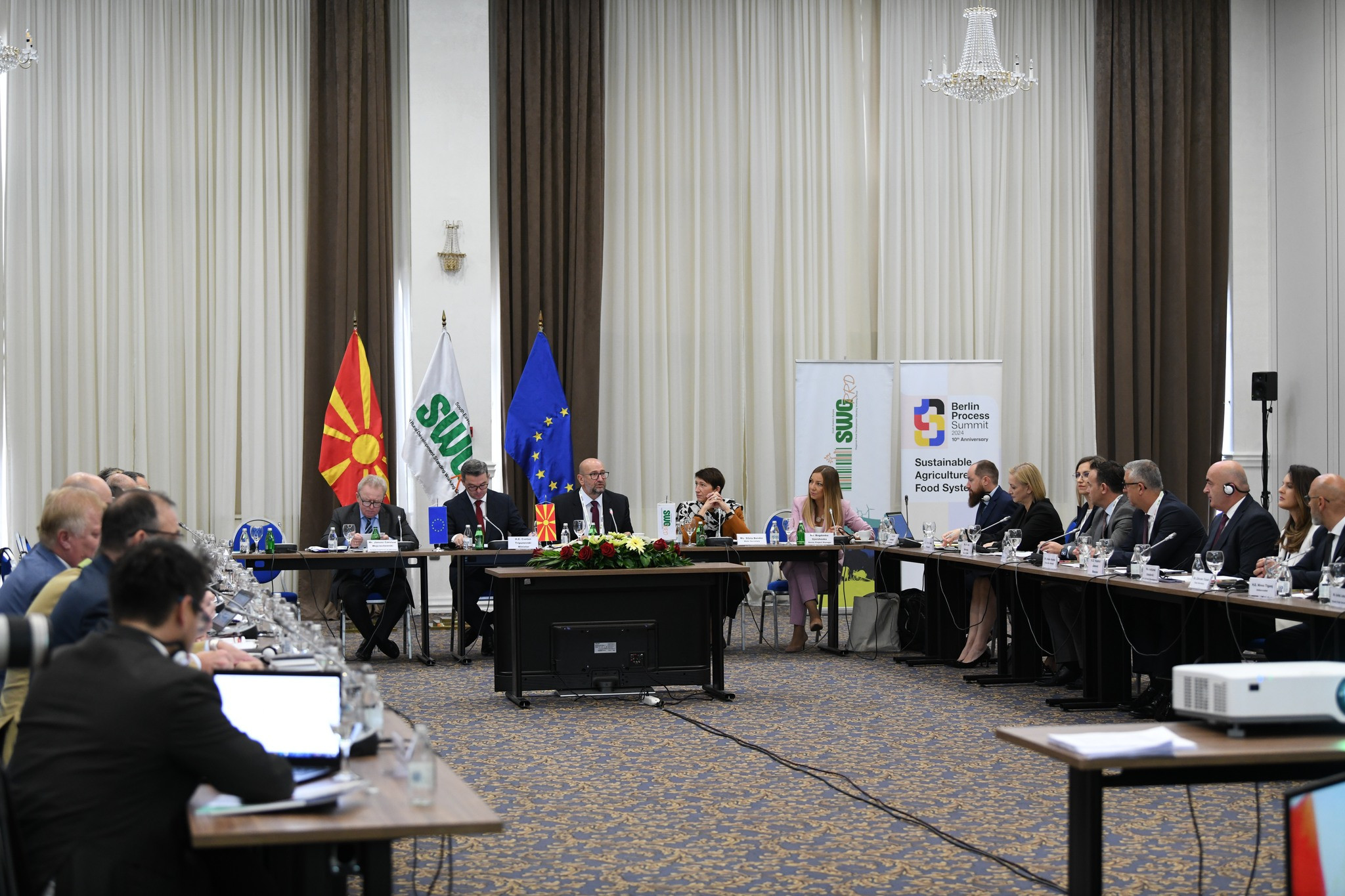
For the first time, a declaration on food and agriculture was adopted by the agriculture ministers of the Western Balkan countries as part of the Berlin Process - the: “Skopje Declaration.”
The focus was on establishing the transformation to sustainable, environmentally and climate-friendly agriculture and rural development as an integral part of the Berlin Process, improving cooperation and strengthening these sectors as crucial for the EU integration efforts of the Western Balkan countries.
The adoption took place on the occasion of the 18th Annual Working Meeting of the Ministers of Agriculture of South-Eastern Europe (SEE) on September 24, 2024 in Skopje, North Macedonia. The meeting, which was jointly organized by the Ministry of Agriculture, Forestry and Water Management of North Macedonia and the SWG RRD, Standing Working Group for Regional Rural Development, in SEE, focused on aligning regional objectives with the broader policy agenda of the Western Balkans' integration into the European Union (EU). The Berlin Process meeting was chaired by State Secretary Bender from BMEL. EU Commissioner Wojciechowski praised the Skopje Declaration as a very important step at the right time, covering all important issues in terms of content.
You can access the Declaration here.
Picture: SWG Secretariat
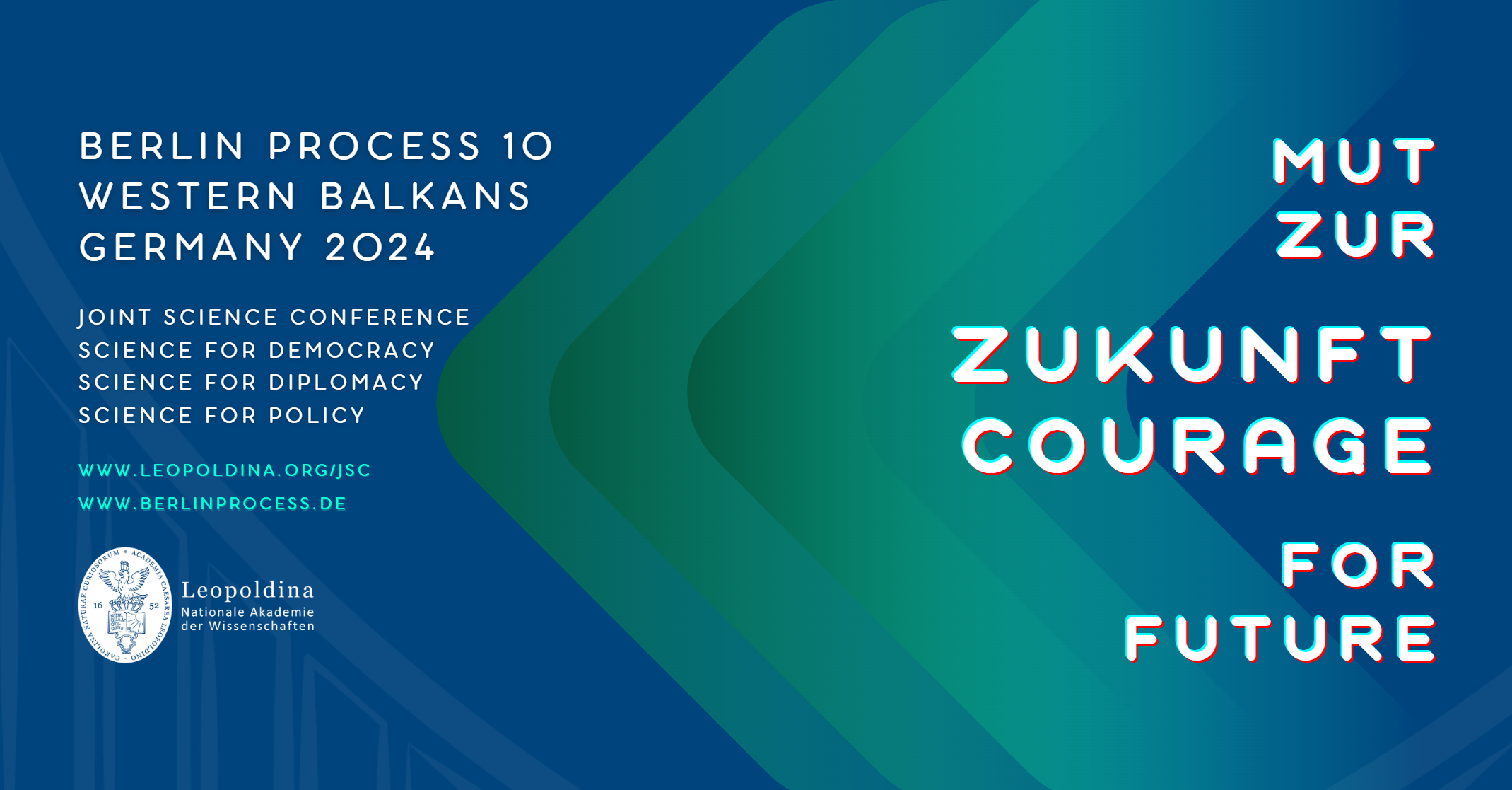
The eighth Joint Science Conference of the Berlin Process took place in Berlin on 30 September and 1 October 2024 under the motto ‘Courage for Future’. 60 heads of scientific institutions and experts from 16 countries discussed topics of current relevance. Firstly, a joint science policy position was developed for the greater integration of the Western Balkans into EU structures and programmes for education, research and innovation.
This sector is one of the ‘champions’ of EU integration in the Western Balkans; accordingly, the association status of the Western Balkan countries should be utilised in the best possible way. Another key topic was the so-called ‘third mission’ of education, science and culture - in addition to the traditional tasks of teaching and research. The need for new discourses and safe spaces for dialogue was discussed in order to promote the socio-political responsibility of science and culture in strengthening democracy and the European ideal in South Eastern Europe.
The event was opened by the Federal Minister of Education and Research, Bettina Stark-Watzinger. The event concluded with an exchange with the Chairman of the Committee on Education, Research and Technology Assessment of the German Bundestag, Kai Gehring. The German National Academy of Sciences Leopoldina coordinates the ‘Education, Science and Innovation’ pillar of the Berlin Process on behalf of the German government.
On October 1, 2024, the Foreign Ministers of the Western Balkan countries—Albania, Bosnia and Herzegovina, Kosovo, Montenegro, North Macedonia, and Serbia—along with their counterparts from Austria, Bulgaria, Croatia, Greece, Slovenia, the United Kingdom, and Hungary, which currently holds the European Council presidency, convened at the Federal Foreign Office in Berlin. Representatives from Italy, Poland, France, the European Commission, and the European External Action Service also participated in the meeting, working collaboratively to bring the Western Balkans closer to the European Union. Discussions focused on enhancing regional economic cooperation, improving mobility within the region, forging climate partnerships, and promoting gender equality.
In recognition of the 10th anniversary of the Berlin Process, the Western Balkans Six agreed on several key initiatives to strengthen regional cooperation and advance the Common Regional Market, as well as foster good neighbourly relations:
- A significant achievement is the Agreement on Access to Higher Education and Admission to Higher Studies, which aims to provide students in the Western Balkans with the right to study at accredited higher education institutions across the region. This agreement, which also promotes student mobility, is set to be finalized at the Berlin Process Summit on October 14, 2024.
- The participants endorsed a Declaration on Regional Foreign Direct Investment (FDI) Screening Standards for the Western Balkans. These standards are designed to align investment policies with EU regulations and international best practices, thereby enhancing the region’s attractiveness to foreign investors.
- A Joint Declaration on Research and Innovation Infrastructure Access and Collaboration was also agreed upon, which will encourage partnerships in research and innovation, supporting the development of a dynamic regional innovation ecosystem.
- Lastly, the Western Balkans Six reaffirmed their commitment to regional cooperation by adopting a Joint Declaration on Good Neighbourly Relations and Regional Cooperation. This declaration will be formally endorsed at the upcoming Summit, marking the 10th anniversary of the Berlin Process.
Further Information:
Picture: German Foreign Office
On 8 October 2024, the first ministerial meeting on the Green Agenda for the Western Balkans took place on the margins of the Hamburg Sustainability Conference. Following the adoption of the Green Agenda and the Action Plan 2021-2030, the region's environment ministers came together for the first time to renew their commitment and review progress on implementation. Germany is supporting the implementation of the Green Agenda through an interministerial Regional Climate Partnership with the Western Balkans. The German side was represented by Federal Minister Svenja Schulze (BMZ), Parliamentary State Secretary Dr Bettina Hoffmann (BMUV) and the Federal Government's Special Envoy for the Western Balkans Manuel Sarrazin. The participants signed the Hamburg Declaration, thereby confirming their commitment to climate protection and sustainability!
Picture: Federal Ministry for Economic Cooperation and Develepment & Federal Ministry for Economic Affairs and Climate Action
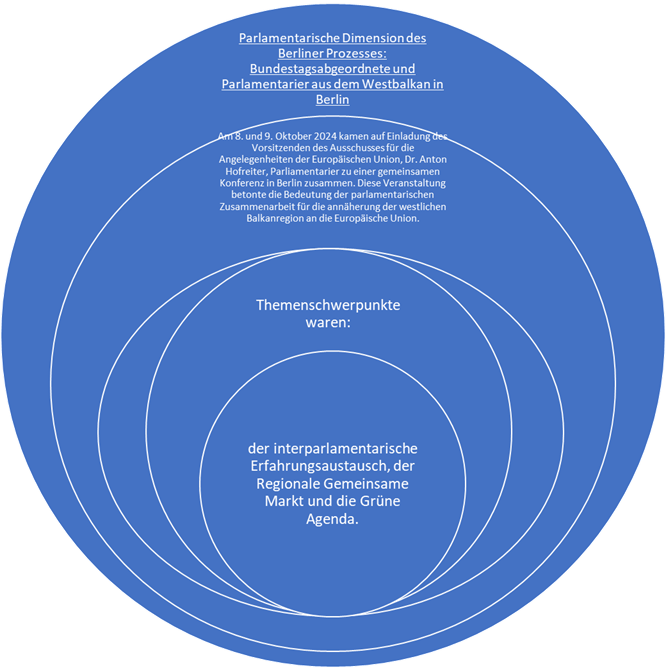
The Parliamentary Dimension of the Berlin Process event, organized by the Institute for Democracy "Societas Civilis" Skopje (IDSCS) and hosted at the German Bundestag, took place on 9 October. Supported by the German Federal Foreign Office, the event brought together Members of Parliament from the Western Balkans and the Bundestag, as well as parliamentary staff and think tank representatives, to discuss their roles within the Berlin Process.
Key discussions centered on how parliamentary diplomacy can help advance reforms that align the Western Balkans with European Union standards. Dr. Anton Hofreiter, Chairman of the Bundestag's Committee on European Union Affairs, and Marko Troshanovski, President of IDSCS, opened the event by reaffirming the shared commitment to these reforms.
The event marked the second time the Parliamentary Dimension of the Berlin Process has been held, underscoring the growing importance of parliamentary collaboration in areas such as regional economic development, renewable energy, and the rule of law. Participants stressed that while government-level decisions are essential, it is ultimately the parliaments that must translate them into actionable laws. This emphasizes the need for continued dialogue and cooperation among parliaments, with calls to institutionalize the parliamentary dimension as an annual fixture of the Berlin Process in the future.
Further Information:
Parliamentary Dimension of the Berlin Process hosted by IDSCS at the Bundestag - IDSCS
As an official side forum of the Berlin Process, the 2024 Civil Society and Think Tank Forum (CSF) brought together representatives from over 115 civil society organizations to actively contribute to and influence the Berlin Process. The Southeast Europe Association and the Aspen Institute Germany, as co-organizers of the CSF, highlighted the forum's significant impact, which included high-level exchanges between civil society, Western Balkans governments, EU representatives, and other key stakeholders.
This year’s CSF established seven thematic working groups to develop targeted recommendations in collaboration with civil society leaders. These groups addressed critical topics such as EU integration and the Berlin Process; Dealing with the Past and Reconciliation; Gender and Diversity; the Common Regional Market and Mobility; Energy, Climate Change, and Decarbonization; Environmental Protection and Sustainable Economic Development; and Disinformation and Cyber Threats. Across all groups, cross-cutting issues like the rule of law, youth, minorities, and local concerns were integrated into the discussions. Notably, for the first time, the CSF featured a dedicated working group on gender and diversity, including grassroots organizations from both the Western Balkans and the EU.
Participants also shared their vision for how the future of the Berlin Process could better reflect their priorities, presenting their own ideas for potential reforms and improvements.
Further Information:
Picture: German Foreign Office
In addition to their aspirations for European integration and advancing democratization, young people in the Western Balkans are united by shared challenges. Strengthened cooperation among youth is seen as crucial for fostering reconciliation and addressing current issues. This key message was emphasized during the Western Balkans Youth Forum, held on October 13 and 14 in Berlin, Germany.
The forum was organized by the Regional Youth Cooperation Office (RYCO), the Franco-German Youth Office (OFAJ DFJW), and the non-profit organization Bürger Europas, within the framework of the Berlin Process. It brought together over 100 participants, including representatives from regional governments, EU member states, and EU institutions, alongside youth from the Western Balkans and other European countries. This year’s Youth Forum placed special emphasis on celebrating the tenth anniversary of the Berlin Process, offering participants the opportunity to reflect on past achievements and discuss future steps to further enhance youth collaboration across the region.
Further information here.
Picture: German Foreign Office
Hosted by German Chancellor Olaf Scholz, the Berlin Process Summit commemorated a decade since its inception in 2014. Participants reaffirmed the initiative's crucial role on its 10th anniversary in bolstering regional connectivity, trade, energy cooperation, transportation, innovation, and the green transition in the Western Balkans. This was emphasized in the first of 48 Chair’s Conclusions adopted at the Summit.
During the event, the Prime Ministers of the Western Balkans Six signed both a Declaration of Support for the Common Regional Market Action Plan 2025-2028 and an Agreement on Access to Higher Education and Admission to Higher Studies.
The Chair’s Conclusions, which are adopted at every annual Summit, highlight that participants reviewed progress, challenges, and opportunities for regional cooperation in the Western Balkans as a pathway toward the region's eventual alignment with European Union rules and regulations.
Additionally, the conclusions welcomed the lifting of obstacles to the Central European Free Trade Agreement (CEFTA), a cornerstone for implementing the Common Regional Market, during the Joint Committee Meeting on 9 October 2024. Ten decisions, an Additional Protocol, and one Recommendation were adopted to further develop the regional market and deliver tangible benefits for the citizens of the region.
In the 16th conclusion, the Western Balkans Six reaffirmed their commitment to regional cooperation and good neighbourly relations through an agreed Joint Declaration.
Other conclusions addressed issues in Youth, Science and Education, Connectivity and Transport, Energy, Climate Policy and the Green Agenda, Food and Agriculture, Social Policy, Inclusion, Gender Equality, Migration, and Security. Finally, participants underscored the importance of continuing the Berlin Process to fully realize the potential of enhanced and inclusive regional cooperation.
Find below the documents of the summit:
Declaration on Common Regional Market
Common Regional Market Action Plan
Joint Declaration on Reaffirming Good Neighbourly Relations and Regional Cooperation
Agreement on Higher Education
Picture: German Federal Government / Thomas Köhler
